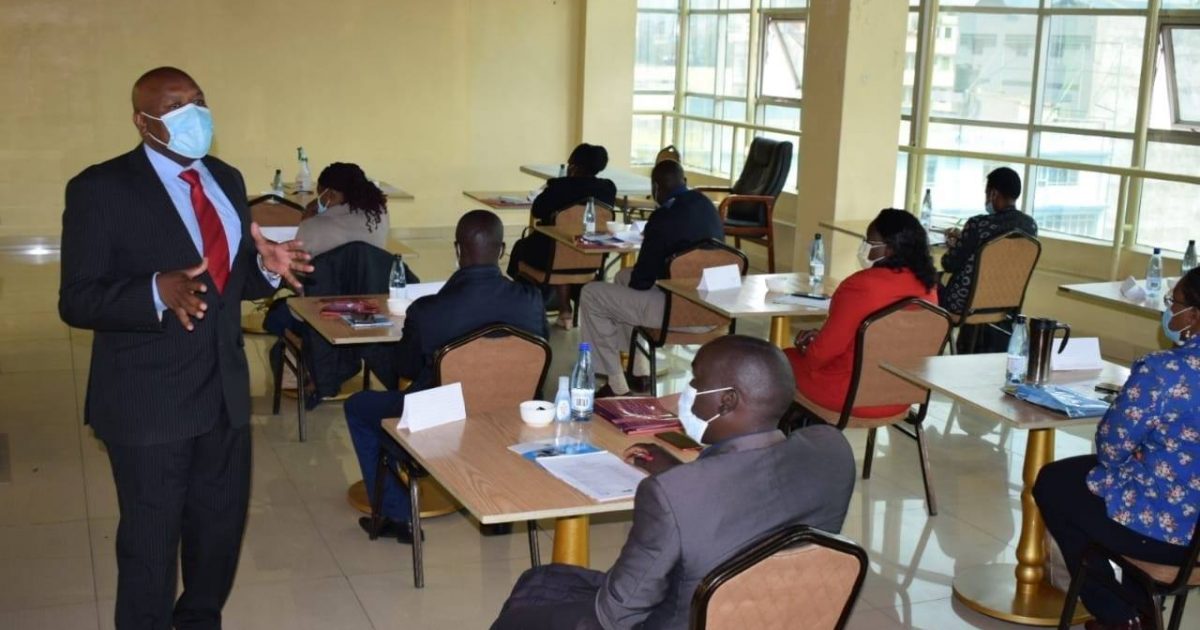The County Government of Nakuru in partnership with Africa Medical Research Foundation (AMREF) has trained 60 animal health assistants on surveillance of diseases that are transmitted from animals to humans.
County Executive Committee Member for Health Dr. Zachary Gichuki Kariuki said cases of the ailments also known as zoonotic diseases such as Covid-19, Ebola, Sars (Severe Acute Respiratory Syndrome), Bird flu and swine flu were steadily rising globally.
The word is derived from the Greek words zòon (animal) and nosos (ill). Zoonoses may arise from wild or domestic animals or animal products.
Speaking when he closed the three-day training session at County headquarters, Kariuki said the animal health assistants will work jointly with health officers at sub-county level in rolling out a program dubbed Community Event- Based Surveillance System (CEBs).
“The program is designed to identify and track Covid-19 cases and other zoonotic diseases that might signal an outbreak.
It seeks to ensure that information on a potential public health crisis is reported by people at grassroots via Community Health Volunteers (CHVs), Health department’s hotline and other electronic messaging systems,” he noted.

Dr. Gichuki said that though some of the well-known zoonotic ailments such as tuberculosis, rabbit fever, rabies, Toxocariasis, HIV/Aids and among others had been around for centuries, new ailments were emerging due to environmental changes and increased human interaction through local and international travel.
He was accompanied by Kenya Medical Research Institute (KEMRI) representative Ms Nancy Otieno, County Director of Veterinary Services, Dr Githui Kaba and Director Public Health, Ms. Elizabeth Kiptoo.
“Diseases break out at community level. A surveillance system based at the community level will ensure prompt action is undertaken before an outbreak escalates into a pandemic” stated Dr. Kariuki.
Covid-19 is believed to have emerged in a meat market in the central Chinese city of Wuhan in October last year.
Experts have maintained that Covid-19 originated from bats and could have been transmitted on through another mammal probably a pangolin, an endangered species whose meat and scales are vastly valued in parts of Asia.
Dr. Kaba observed that while grooming and vaccination of domestic animals was essential for their owners’ safety, very few Kenyans took their pets to the vets, and neither washed nor shampooed them.
“Domestic animals play an important role in our lives, we keep them for functional reasons like cats to catch or chase away mice, dogs to guard homesteads, rabbits for meat and birds for ornamental purposes.
Animal diseases and infections, like rabies, are transmitted through contact with infected animals through bites and scratches, or through ingestion by man. Infections can also be transmitted through vectors like ticks and mites” noted the County Director of Veterinary Services.
He advised pet owners to take their animals or birds to the vets whenever they show any signs of diseases or illnesses.
Dr. Kaba asked them to ensure that their pets are up to date with their vaccinations, especially rabies, parvovirus and Distemper Hepatitis Leptospirosis Parainfluenza (DHLP). Meat and meat products he stated should be properly cooked before being consumed.
“Pets, especially dogs, should be washed and groomed regularly at least once a week or after two weeks with a shampoo that kills and prevents external parasites.
Pets’ food and water dishes should be kept separately from the family dishes. Pet’s cages or kennels should be washed frequently to avoid tick and flea infestation” explained Dr. Kaba.
Ms Otieno said the Community Event Based Surveillance System (CEBs) would ensure timely interventions are put in place when a disease outbreak is detected.
The devolved unit is currently targeting 349 Community Health Units to train 3,400 Community Health Volunteers on disease surveillance and detection.
According to the UN Environment Programme (UNEP), 60 percent of human infectious diseases originate from animals.
This figure climbs to 75 percent for “emerging” diseases such as Ebola, HIV, avian flu, Zika, or SARS, another type of coronavirus.
The IPBES Global Assessment Report on Biodiversity and Ecosystem Services estimates that Zoonoses kill some 700,000 people a year and lists rodents, primates and bats as hosts of three-quarters of viruses transmitted to humans.
People who raise or work with pigs have a higher risk of zoonotic infection. Other professionals at particular risk include veterinarians and meat processing workers.
By Anne Mwale /David Mururia



